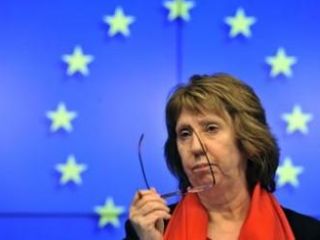Poland and Germany were both initiators and drivers of a New Eastern policy linked to the Eastern neighborhood and Russia/Soviet Union.
Andrei Yahorau: EU is dragging time, hoping that Russians will stop supporting gunmen in Donbas

Defenseless EU resolution not only conceals the direct perpetrators of Boeing 777 catastrophe, but also sharply contrasts with the unambiguous statements made by numerous leaders of European states.
On July 22 EU Foreign Affairs Council in Brussels was discussing the possibility to toughen sanctions against Russia. The destruction of the international airliner Boeing 777 in Donetsk region by the gunmen, supported by Russia, transformed local Ukraine-Russia conflict into an international problem. 298 people, most of them is citizens of the EU, died in the catastrophe; and that required clear and unequivocal assessment of the situation in the eastern Ukraine from the EU.
However, the EU isn’t going to toughen sanctions against Russian officials and the politicians in the so-called Donetsk and Luhansk “People’s Republics”, and postponed the final decision until July 24.
How efficient can be the new sanctions introduced by the EU against Russia? EuroBelarus Information Service talked about it with Andrei Yahorau, the head of the Centre for European Transformation.
— Did the EU finally introduce sanctions against Russia or not? The results of the meeting of the Council of Foreign Ministers held on July 22 in Brussels didn’t clarify anything, except for the statement made by Catherine Ashton, saying that Russia has time to fix everything before July 24.
— The issue of sanctions is now only a matter of technicalities: before July 24 EU Commission and European External Action Service should prepare recommendations regarding technical opportunities of realization of targeted sanctions, i.e. draw up the lists of officials and enterprises, which will be included in the final list.
It remains unclear what will become of that. The EU sanctions might become the continuation of the US policy — such measures can be quite efficient, though not dangerous for Russia.
The EU Council is obliged to make decisions regarding the introduction of the economic sanctions. Of course, sanctions take into consideration the position of the countries-members of the EU. For now it is unclear whether the final list will include Russian enterprises, or it will be limited to the targeted sanctions against separate officials.
EU resolution says that there is a possibility to toughen economic sanctions unless Russia fulfills the obligations that it gave earlier before July 24.
And if Russia doesn’t stop supporting the gunmen, if the separatists don’t fulfill the recommendations of the international community and don’t let the experts investigate the Boeing 777 catastrophe, it will serve as a ground to recognize separatist groups as terroristic organizations.
— How efficient will be the new sanctions introduced by the EU against Russia, and are they enough to influence Kremlin’s position?
— I doubt that the European sanctions will be enough tough and adequate to the situation. EU is dragging time, hoping that Russians will stop supporting gunmen in Donbas. From my point of view, situation with the destruction of Boeing 777 put the gunmen at an absolutely different level — de-facto, EU citizens have died. Thus, the reaction of the EU Council doesn’t seem enough tough and adequate; and accordingly, the sanctions won’t be enough tough and adequate, too.
— What is the EU position in regard to the Boeing 777 catastrophe in Donetsk region? On the threshold of the meeting the world leaders and foreign ministers were directly blaming the gunmen and Russia for the attack. Does this line remain in the resolution adopted on July 22?
— No direct culprits of the Boeing 777 tragedy are named in the resolution; the wording of the document is very discreet. EU politicians are indirectly involving Ukrainian authorities in the conflict, as well as are indirectly agreeing with Russia: unless Ukraine had renewed the anti-terror operation this tragedy wouldn’t have happened.
Casuistic rhetoric of the EU resolution sharply contrasts with the unambiguous statements made by numerous leaders of European states, who said that it is Russia and the gunmen who are to blame for the destruction of Boeing-777. It contravenes clear statements made by the Foreign Ministers of Lithuania and Great Britain, who stand for tougher EU sanctions against Russia. We see big difference between the statements made by the world leaders and the defenseless EU resolution.
Others
-
Uladzimir Matskevich: The sooner the "Union State" is denounced, the better for Belarus
Not only does the “Union State” undermine the establishment of civilized relations with Europe, but it hinders the possibility of normal relations between Belarus and Russia.
-
Uladzimir Matskevich: The regime can no longer control the situation in the country
The authorities are unable to prolong the social contract with the people: there is no way out of the social crisis.
-
Press release of the BNP in connection with the next round of the dialogue in the format of the EU-Belarus Coordination Group
Belarusan National Platform of the Eastern Partnership Civil Society Forum welcomes the dialogue process in the format of the EU-Belarus Coordination Group, the third round of which was held in Minsk on 3-4 April 2017.
-
Hennadiy Maksak: Europe must react adequately to the events in Minsk
A new wave of political repressions should make the EU return to tougher policy towards the Belarusan regime.








Comments
From farewell to a new Eastern policy and towards a new development
Poland and Germany were both initiators and drivers of a New Eastern policy linked to the Eastern neighborhood and Russia/Soviet Union.